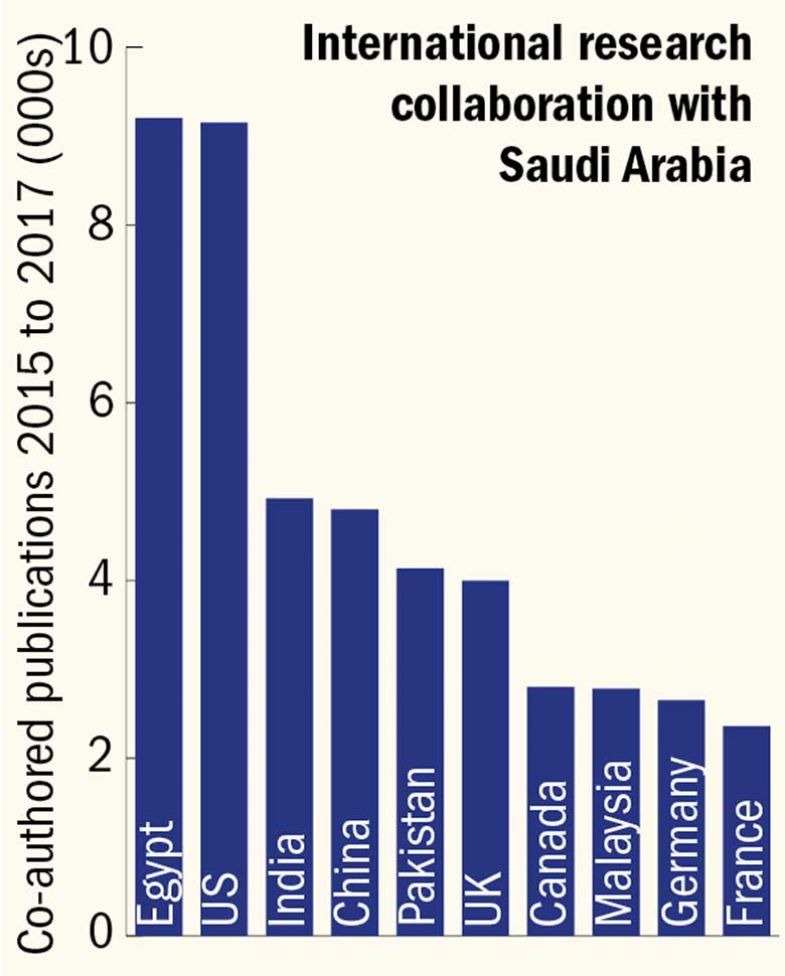Western universities are under increasing pressure to reject funding from Saudi Arabia and terminate their partnerships with the country in the wake of the allegedly premeditated and state-sanctioned murder of journalist Jamal Khashoggi.
Saudi Arabia’s account of how Mr Khashoggi, a leading critic of the Riyadh regime, died at the Saudi Arabian consulate in Istanbul has been widely derided, leading to calls for Western governments to break trade ties with the country.
The case has also turned the spotlight on Western universities’ relations with the kingdom.
According to data from Elsevier’s SciVal analysis tool, 73 per cent of Saudi Arabian academic publications in 2017 involved co-authorships with researchers based outside the country, up from 42 per cent in 2009.
Between 2015 and 2017, Egypt was Saudi Arabia’s main collaborator, closely followed by the US. The UK is sixth and Canada is seventh. Western institutions with close research links with Saudi Arabia include Harvard University, Massachusetts Institute of Technology, the University of Toronto, Imperial College London and UCL.
Meanwhile, several universities have received large gifts from the kingdom. The late King Fahd donated £20 million to the Oxford Centre for Islamic Studies for the construction of new buildings in 1997, while in 2008 the universities of Cambridge and Edinburgh each received £8 million from Prince Alwaleed bin Talal to fully finance Islamic study centres.
This week, MIT’s associate provost Richard Lester announced in a letter to staff that the university was conducting “a swift, thorough reassessment of MIT’s institute-level engagements with entities of the kingdom of Saudi Arabia” but said that “individual faculty members who have or are considering engagements with Saudi Arabia will make their own determinations as to the best path forward”.
In tandem: top partners

Christopher Davidson, visiting fellow at Leiden University and an expert in Middle Eastern politics, said that Mr Khashoggi’s murder was “the latest in a very long series of reminders that the kingdom of Saudi Arabia…should have never been considered an appropriate partner and donor for our leading universities, and most especially those with a long-standing interest in researching Middle East politics and Islamic studies”.
“Money from Saudi Arabia, including from leading ruling family members, has been part of a long-running effort by the kingdom to burnish its image abroad and build up ‘soft power’ influence in countries such as the UK and the US, which are deemed important security guarantors,” he said.
“In this sense, university administrators and senior academics who have been willing to look the other way in exchange for career advancement have thus played a small but important role in supporting and perpetuating the Saudi regime into the 21st century.”
Yarden Katz, departmental fellow in systems biology at Harvard Medical School, was one of several academics who criticised the fact that Harvard and MIT did not publicly announce in advance a visit by the crown prince, Mohammad bin Salman, to the universities in April.
“We are not arguing that places like MIT and Harvard are so ethically pure that they shouldn’t associate with the Saudi government, but rather that universities themselves are so compromised that they need to rethink how they do things altogether,” Dr Katz told Times Higher Education, adding that “partnerships, which are negotiated behind closed doors, and whose terms are generally unknown, are the issue”.
He said that Saudi Arabia’s recent decision to recall its students from Canada indicates that its programmes with Western countries “aren’t sincere sustained investments in research and education” but “ways to gain legitimacy and advance bin Salman’s PR campaign”.
Melodie Jackson, assistant vice-president of communications at Harvard, said that the institution was “following recent events with concern and assessing potential implications for existing programmes” with Saudi Arabia.
A spokesman for Imperial said: “Imperial researchers collaborate with high-quality academic partners around the world. Some co-author papers with scholars based at universities in Saudi Arabia. This is aligned with our academic mission and is part of our work to advance knowledge in science, engineering, medicine and business.”
Register to continue
Why register?
- Registration is free and only takes a moment
- Once registered, you can read 3 articles a month
- Sign up for our newsletter
Subscribe
Or subscribe for unlimited access to:
- Unlimited access to news, views, insights & reviews
- Digital editions
- Digital access to THE’s university and college rankings analysis
Already registered or a current subscriber? Login








